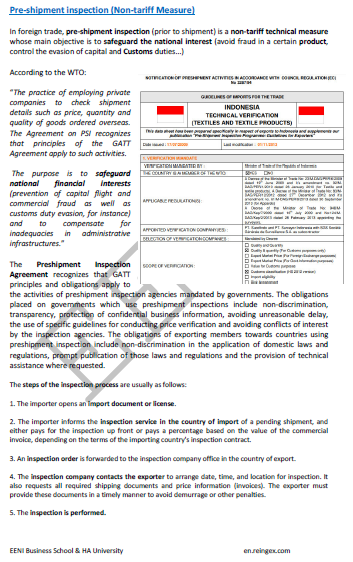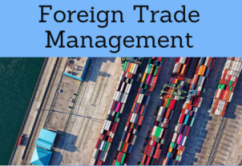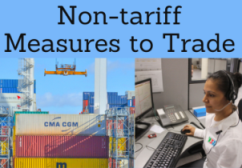
Agreement on Preshipment Inspection WTO
Analysis of WTO Agreement on Preshipment Inspection (Foreign Trade)
- Preshipment Inspection (PSI) in Foreign Trade
- Introduction to the WTO Agreement on Preshipment Inspection
Sample - Agreement on Preshipment Inspection:

The objectives of the subject “Agreement on Preshipment Inspection” are the following:
- Understand the pillars of the WTO Agreement on Preshipment Inspection
- Know the importance of the Preshipment Inspection in the export & import operations
- An in-depth analysis of the Agreement on Preshipment Inspection to evaluate the implications for an exporting company

The Subject “Agreement on Preshipment Inspection” belongs to the following Online Programs taught by EENI Global Business School:
Courses: Non-tariff Measures, Foreign Trade Management.


Masters: International Business, Foreign Trade, International Transport.

Trade Facilitation - Trade Facilitation Agreement - Kyoto Convention - Convention Harmonization of Frontier Controls of Goods.
Learning materials in

 Acuerdo sobre Inspección Previa a la Expedición
Acuerdo sobre Inspección Previa a la Expedición  Accord sur l’inspection avant expédition
Accord sur l’inspection avant expédition  Acordo sobre a Inspeção Pré-embarque.
Acordo sobre a Inspeção Pré-embarque.


In Foreign Trade, the Preshipment Inspection consists of external companies or bodies verifying the exports of a company. This information can be based on the Export price (to avoid over billing), quality or quantity of the products to be exported.
The custom classification of the goods to be exported may also be included in this agreement.
All these practices (Non-tariff Measures and Technical Barriers to Trade), common in Foreign Trade, are recognized in the Agreement on Preshipment Inspection of the WTO.
This type of pre-shipment inspections are implemented by the Governments as a Safeguard measure seeking to protect the general interest of the country. These measures also help to prevent tax and Customs fraud.
The Agreement on Preshipment Inspection of the WTO forces to the governments to act in a transparent and non-discriminatory manner, in addition to not impeding the foreign trade facilitation.
The Agreement on Preshipment Inspection requires that the inspection be carried out in the custom territory from which the goods are exported.
Non-tariff Measures:
(c) EENI Global Business School (1995-2024)
We do not use cookies
Top of this page


